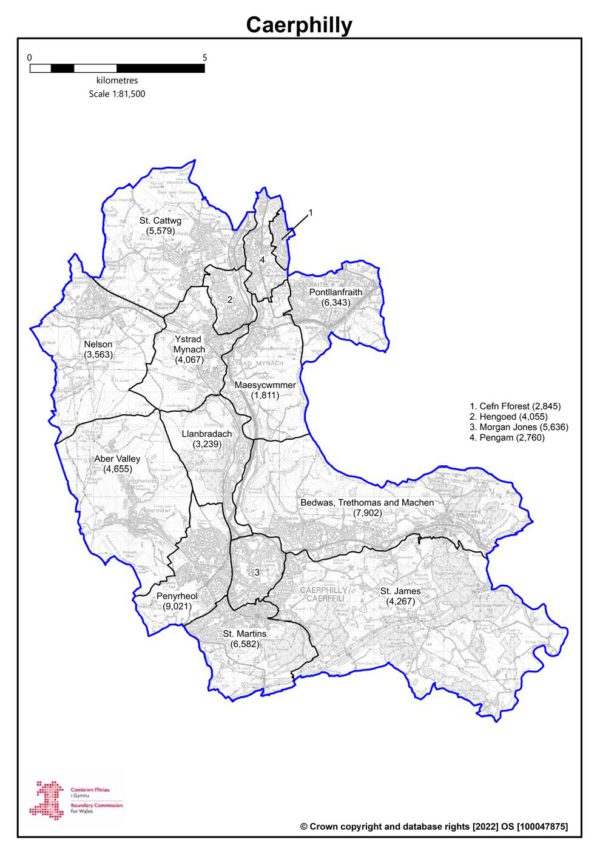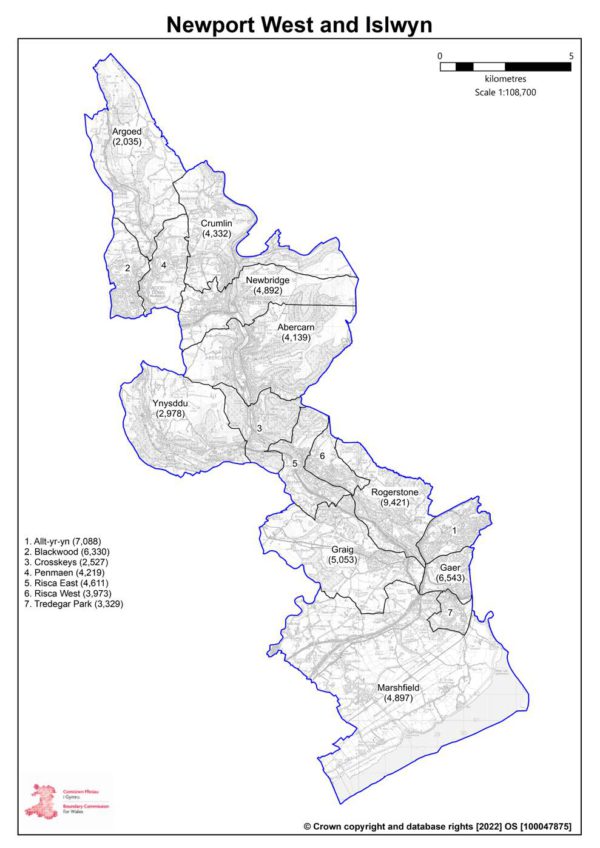Support quality, independent, local journalism…that matters
From just £1 a month you can help fund our work – and use our website without adverts. Become a member today

Last year, controversial proposals which would see the Caerphilly parliamentary constituency broken up and divided amongst four other constituencies were put forward.
The proposals were suggested by the Boundary Commission for Wales, which was tasked with reducing the number of parliamentary constituencies in Wales from 40 to 32.
The changes would come into force before the next UK General Election, which will take place before January 2025.
However, the Boundary Commission has now published its revised review – with major changes from the original proposals.
Plans to merge Caerphilly town, Aber Valley and Bedwas, Trethomas, Machen with Newport West to create a ‘Newport West and Caerphilly’ constituency have been shelved.
The plans would also have seen Llanbradach, Ystrad Mynach, Hengoed and the St Cattwg ward merged with the existing Islwyn seat.
See the initial boundary change proposals here.
However, the latest review sees the current Caerphilly constituency remain relatively intact, minus the loss of Bargoed and Gilfach, with the addition of Cefn Fforest and Pengam, as well as the Pontllanfraith and Maesycwmmer wards.

The seat would have 72,325 electors.
Nelson would remain in the Caerphilly constituency too, despite initial plans moving the area into a newly-created ‘Merthyr Tydfil and Aberdare’constituency.
Instead, the new proposals pair the majority of the current Islwyn constituency with Newport West, to create ‘Newport West and Islwyn’.

This constituency would include the wards of Abercarn, Argoed, Blackwood, Crosskeys, Crumlin, Newbridge, Penmaen, Risca East, Risca West and Ynysddu.
They would be linked with the Newport wards of Allt yr Yn, Gaer, Graig, Marshfield, Rogerstone and Tredegar Park.
The seat would have 76,367 electors.
Following initial plans to merge Caerphilly with Newport West, Caerphilly’s Labour MP Wayne David made counter-proposals to the commission, which by and large have been adopted in the new proposals.

Welcoming the changes, Mr David, who has already announced he is stepping down at the next election, said: “I am delighted that the Boundary Commission has accepted most of my counterproposals and the overwhelming view that Caerphilly should not be linked to Newport, but to its natural valley hinterland.
“There has been a groundswell of opinion in the Lower Rhymney Valley against what was initially suggested.
“At the public hearings a number of community representatives put the case for my counterproposal.
“They included the Chair of Bedwas, Trethomas and Machen Community Council, the Police and Crime Commissioner for Gwent, Borough councillors from Labour and Plaid Cymru, the Welsh Liberal Democrats, the Secretary of the Caerphilly Miners’ Centre and the Secretary of the Caerphilly Constituency Labour Party, as well as myself.”
Mr David continued: “In addition, there were written submissions from a range of community organisations and individuals in the Lower Rhymney Valley. Among these were letters from community councils in the area, the chairmen of Caerphilly Male Voice Choir and Senghenydd Rugby Club, Hefin David MS and petitions from the congregation of St Helen’s Catholic Church in Caerphilly and Aber Valley Male Voice Choir.”
Mr David said he was “pleased” public opinion had been listened to and said the new proposals are “much more sensible than originally suggested”.
Elsewhere, Aberbargoed and Bargoed, as well as Gilfach, would form part of the new ‘Blaenau Gwent and Rhymney’ constituency.

This constituency would also include the wards of Darran Valley, Gilfach, Moriah, New Tredegar, Pontlottyn and Twyn Carno, alongside Blaenau Gwent.
In total, 71,079 electors would live in this ward.
A four-week consultation into the new proposals will now open, but it is likely that any further changes would be minor.
The consultation closes on November 15, with changes implemented from 2023 onwards.
Public response
During the consultation period into the original proposals, the commission received 1,367 written representations and 81 oral representations.
Writing in the foreword of the report on the new proposals, Mrs Justice Jefford DBE said: “Public hearings were held across Wales to enable members of the public to express their views on the initial proposals and to suggest how they could be amended and improved.
“The commission is extremely grateful to all those who took the time to contribute.
“As a result, the commission has revised the initial proposals. It has proposed changes, often significant changes, to 22 of the 32 proposed constituencies.
“It has also proposed different names for nine of the constituencies. There is now an opportunity to make representations on these revised proposals before the commission makes its final report on proposed parliamentary constituencies in Wales.”
Why are these changes happening?
The changes are happening as part of a UK-wide shake-up of parliamentary constituency boundaries.
Earlier proposals would have seen the number of MPs reduced from 650 to 600 across the UK, but this reduction was shelved due to the increased workload faced by MPs in the aftermath of Brexit.
Under rules set out in the Parliamentary Constituencies Act 1986, each constituency proposed by the Boundary Commission must contain a roughly similar size electorate – somewhere between 69,724 and 77,062 electors.
The shake-up is happening due to the fact populations change over time, so therefore boundaries need to be redrawn to ensure communities are fairly represented in Parliament.
However, the Boundary Commission for Wales had no power in setting the number of constituencies in Wales – that was decided by the UK Government.
These boundary changes are happening across the UK to ensure parliamentary constituencies contain roughly similar size electorates. Due to population changes over the years, these boundaries have been redrawn numerous times in the past.
But while Wales loses seats, England’s number of seats will rise by ten to 543.
The number of seats in Scotland will drop by two to 57, while the number of seats in Northern Ireland (18) will stay the same. However, these boundary changes will not affect Senedd constituency boundaries, which will remain as they are for the time being.
The commission says it takes factors such as population, lakes, mountains and rivers into consideration when putting forward proposals, as well as local authority boundaries.
Visit the Boundary Commission for Wales’s website to view the proposals in full.
Support quality, independent, local journalism…that matters
From just £1 a month you can help fund our work – and use our website without adverts.
Become a member today
